Crispy Critters: Breaking Down the Awfulness of P-3
By gamer_152 4 Comments
Note: The following article contains major spoilers for Atomic Heart, The Catcher in the Rye, Fight Club, and Goodfellas.
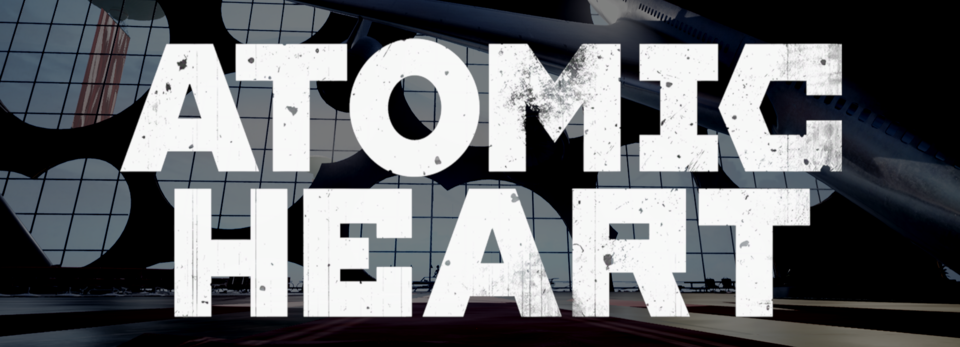
If you want to criticise Atomic Heart, there's no shortage of unprotected flanks for you to stab at. There's an open world that is hemmed in and devoid of side tasks, there's its history of bugs so severe that you wonder how it ever launched in its initial state, and there's a plot that keeps spinning its wheels instead of making headway. But that's a lot to bite off, and I'd like to see more close reading of games. So, today, I want to put just one problem with Atomic Heart on the stand. His name is P-3, and don't worry, he is going to give us a lot of material.
Atomic Heart's stomping ground is an alternate techno-utopian Soviet Union in the year 1955. The country has traded the hammer and sickle for a syringe and a servo. When a robot uprising ravages their research colony of Facility 3826, politician-scientist Dmitry Sechenov dispatches a WWII vet to bring the automatons to heel. That soldier is Major Sergey "P-3" Nechaev. Based on looks and genre conventions, you might guess P-3 is one of the gruff, personalityless strongmen who has always found work in video game plots. Instead, developer Mundfish makes him a kind of Rick & Morty Chris Kyle.
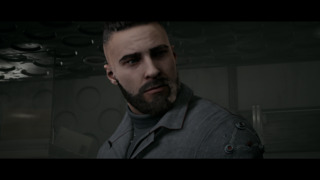
Sometimes, after engaging with a flawed piece of media, I'll suspect that I exaggerated the problems in my memory, but after my return to Atomic Heart, I can confirm that P-3 really is that annoying. He's everything players labelled him as: whiny, arrogant, and embarrassingly unfunny. He has a snide putdown for every person he meets and every task he's assigned, which could be darkly funny if he was witty about it, but P-3 is dumb as drywall. Here are just a few choices lines:
"[When his sidekick tells him he must pick locks himself] In other words, you're basically useless, as always!".
"[When a robot tells him that you can't ride a train if you have signs of pregnancy] I'll show you signs of pregnancy, you piece of shit!".
"Where's the shit-ass way out of here?".
"Rescue the bitch whose fault it is that I'm wading knee-deep in gore? What the fuck?".
"[To his sidekick] Are you friggin' deaf or something?".
"Cripsy critters, now I gotta deal with another crazy-ass lock! Fuck, I'm a magnet for annoying bullshit".
"Crispy critters" is literally his comedy catchphrase. P-3 sounds like he was written by a 13-year-old, and he comes off as a buzzkill in a game that's largely meant to be about the fun of demolishing frenzied robots. He has nothing to say, but he never shuts up, and the most irritating thing about the guy is how smug he is about his warmed-over, flavourless humour. Media audiences are more willing to accept a character's pride if they're entertaining or relatable; this is generally true of personal faults. We can forgive a character for some lies if they're an ingenious manipulator. We can become invested in their stealing if it's a product of pain that has a dramatic weight. We can also empathise with a character doing something we don't approve of if there's a recognisable emotional impetus behind it or if they have redeeming traits. Or we may feel a character's self-confidence is justified if they're acting in a moral interest.

Think about Jimmy McGill in Better Call Saul. He's a chancer and a cheater, and yet, most viewers can't help but root for him because his schemes are so elaborate, and we understand that he is driven in part by an inferiority complex. Firefly's Malcolm Reynolds smirks with self-congratulation, but he generally does the right thing, and he's a fine action hero. In the biopic Shirley, author Shirley Jackson uses her words to deeply wound the people around her, but we also understand that she is chronically depressed and appreciate her attempt to produce great literature even under a cloud of melancholy.
Atomic Heart, however, doesn't have a likeable personality feature to counterbalance P-3's smarm. His jokes also don't serve an important function to anyone and are more complaints than gags. His kvetching is never shown to derive from anything other than bone idleness. He also reserves the same rancour for electronic locks and safety announcements that he does for mass murderers, making him come over as extraordinarily petty.
Your main characters don't have to be endearing. While media that glamourises immoral individuals is fair game for criticism, there's also a shallow read of fiction that's been kicking around recently that says that you have to get on with a character for a story to be worthwhile. "Catcher in the Rye is bad because I couldn't be friends with Holden Caulfield". "Fight Club is poorly written because the narrator is a thuggish fuckboy". I get it. Sometimes, a person, even a fake person, can be so grating that all you're doing by exposing yourself to them is making yourself pointlessly frustrated. And I don't think people saying that they loathe a character by itself are calling for unlikeable characters to be banned or even saying that the writing they appear in is substandard.

But some people are grading stories by the personability of the protagonist, and we can't default to assuming that the morality of a piece of fiction is the morality of its characters. Nor that the quality of a piece of fiction is determined by the moral scruples of its cast. Additionally, by divesting ourselves from media with characters we can't get on with, we block off art that makes valuable points or that could find a new way to engage us. Garth Marenghi in Garth Marenghi's Darkplace, Tommy DeVito in Goodfellas, and Lily Reynolds in Thoroughbreds are just some characters who enrich their stories by being thoroughly unpleasant and allow writers to explore and discuss negative characteristics like selfishness, hubris, and a propensity for violence.
At first, I wondered if Atomic Heart was trying to take the Archer route of generating humour and indicating what kind of person you shouldn't be by forcing its characters to rely on someone conceited and thoughtless. Secret agent thrillers like James Bond say hyper-confident womanising men are the height of cool. Archer says they're manchildren, allowing us to laugh at the title character and the effect of his behaviour on his coworkers. But in these cases where a text succeeds in condemning an unscrupulous main character, it clarifies that it views that character as stupid or despicable through context. Audiences are unlikely to aspire to be Garth Marenghi because he's comically self-serving, and his work is hacky. When Tommy DeVito shoots a waiter in the food for getting the wrong order, the disproportion in this response and the vulnerability of his target mean that DeVito doesn't come off as an action hero but an unhinged sadist. And we know that most of the time, we're meant to laugh at, not with Archer, because the show surrounds him with colleagues who have more maturity and common sense than him, reflecting poorly on the agent.
A text may also ward against the imitation of its characters' malicious behaviours by having those characters get their just desserts. The fight club turns against the narrator, Holden Caulfield ends up estranged from his peers, Tommy DeVito gets whacked. Sometimes media employs both the technique of making the character look unpleasant and having them get their comeuppance at the same time, but Atomic Heart implements neither. P-3's grouchiness is constant enough to feel like gravel in my shoe, but it's also inconsequential enough in the grand scheme of things that it's not like he's evil or going to get into trouble over it. And the other characters in the game echo P-3's tryhard one-note comedy back at him. So, instead of excitable misanthropy being just the Major's way of speaking, a mode and tone of commentary that the game could upbraid with its own voice, it becomes the game's voice.
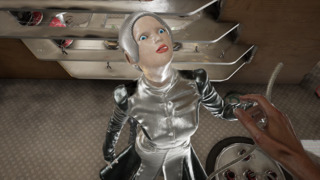
Nechaev's only joke is that he's irritable and mean-spirited. Granny Zina's only joke is that she's an elderly woman with a filthy mouth. NORA's character is that she's obsessed with having sex with P-3. Keep in mind, these are not setups for getting the characters into farcical situations. You can imagine how P-3's temper might leave him between a rock and a hard place professionally or how NORA could end up embarrassing herself by awkwardly trying to engineer social situations in which she can sleep with P-3. But Atomic Heart can't do situational humour; it's an open mic for these characters to do their one bit endlessly.
Atomic Heart's style of humour has no setups, only punchlines. When a lot of comedy succeeds in leading you in one direction and then suddenly diverting you somewhere unexpected, Atomic Heart's humour leads you in one direction and considers that a destination. And besides its jokes falling flat in their construction, they don't work because the characters are hitting their "funny" button with the same fervour of a Skinner box rat requesting sugar water. The characters never hold back their humour, so they can't deploy it with a sense of comedic timing. Given that the non-P-3 humourous characters are made in his image but with less whining, my guess is that Atomic Heart was looking for P-3 to elicit a "he's such an asshole but you've got to love him" reaction. But the game only manages to get as far as "he's such an asshole".
P-3 reflexively deprecates the work he appears in, deriding many of the objectives he's given and the people he interacts with. Like a lot media that pokes fun at itself, Atomic Heart does it as a defence mechanism. About a month before Atomic Heart came out, Austin Walker wrote an apposite blog post on Square Enix's isekai RPG, Forspoken. Clips of Forspoken's cutscenes showed a protagonist who sarcastically mocked the treacherous mythological plane she'd been transported to, and it left online viewers cringing. In Walker's article, he interprets Forspoken's self-mockery as it getting out in front of the audience's criticisms. If a player thinks the whole story is ridiculous, Forspoken is saying that reaction is okay because it thinks it's silly too. But Walker also says that by taking all these opportunities to dress down its characters and setting, Forspoken reduces the player's belief in their quality and tells players who are genuinely excited to engage with its world that they're stupid.
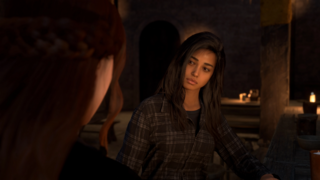
It's important to remember that the flashes of Forspoken's protagonist in these videos don't represent the whole game. But within those clips, it is clear that Frey's voice is intended to sync with the player's. While other characters in Forspoken's setting use dramatic pseudo-historical vocabulary, Frey speaks in 21st-century American idioms, much like the game's core audience. Similarly, in Atomic Heart, P-3 gripes with a casual tone and turns of phrase that are unmistakably modern. Like, "Get the hell out of here", "This place is bright, man", or "Why couldn't they just put regular, more reliable locks everywhere, like with codes and shit?".
Trying to lampshade problems in a text is often a hopeless endeavour, whether the problems are real or fictionalised for the sake of the joke. If an element of your media is unpalatable to your audience, then mocking it doesn't fix the fault, does draw attention to it, and makes the creators look like they aren't taking the quality of their work seriously. If the game complains about an element of itself that isn't actually that bad, however, then the joke can fall flat because it's inaccurate observational humour. The latter is mostly where Atomic Heart ends up.
Atomic Heart's brainteasers and mission structures are passable to enjoyable, but the game keeps reinforcing the idea that they're soulless busywork, particularly because, like Frey, P-3 is a player insert. So, when he complains about the meat of the game, the script imagines that the player's attitude towards the experience is a negative one. Like Frey's cynicism, P-3's comes off as an attempt to preempt poor reception to his game but ironically encourages it. In the examples of both P-3 and Frey, the games also end up insulting the player by presenting a unlikable protagonist and then telling the person in front of the monitor that that person represents them.
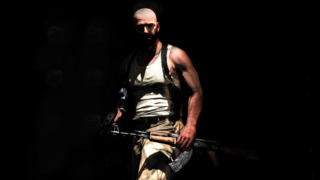
You can have a scumbag audience surrogate that inspires constructive introspection. Kane & Lynch and Max Payne 3 did a fair job of it. But again, P-3's savagery towards his game misses the mark, and he doesn't have a meaningful point to make. Atomic Heart isn't correct that I hate getting all the balls into the receptacle or deciphering door codes, and if it was, so what? Worse, the game thinks that I'm not just a person that dislikes video games but that I'm a crotchety, smug asshole, lashing out at every target in sight like a bumper sticker Dad. That's a hell of an assumption that reveals that the game has an inexplicable disdain for its players. I mean, I am a smug asshole, but Atomic Heart shouldn't know that.
For as much as those Forspoken clips get on my nerves, Frey does have something going for her that P-3 doesn't: The distance between the content and delivery of Frey's speech and those of the figures around her is supported by the narrative. She is a contemporary trespasser in Athia. We can't say the same for P-3. He helped decide the outcome of a world war for his planet, and he is the trusted servant of a Soviet ruler, but in what he says and how he says it, he comes across as a stranger in this strange land. He speaks anachronistically, and it's hard to imagine someone who finds tiny requests a massive imposition to be one of his country's most adept soldiers.
Atomic Heart gets caught up in the allure of amusing and titillating the player and doesn't care what continuity or theming it might have to shed to get there. There's an offputting desperation every time the game drops its aesthetic goals to try and curry favour via the lowest-hanging comedic fruit. Its comedy exists extra to its world instead of within it, which serves neither its humour nor its setting. There's no joined-up explanation of how Facility 3826 engineered a clinically horny vending machine or how P-3 survived a war when he groans every time he's told to eat his vegetables.
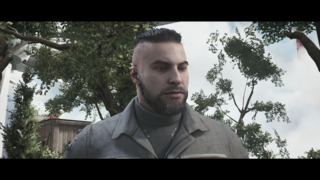
In the title of this article, I did say I'd assess P-3 and not just his whining. I understand if it might sound like I'm doing him dirty by spending so long scanning this one defect of his personality. But there's not much more to this protagonist beyond rolling his eyes at objectives. His only other consistent trait is his blinkered fealty to his boss. The game features dualogues between P-3 and his AI assistant, CHAR-LES, in which CHAR-LES encourages him to think critically about how his commander, Sechenov, might abuse his power. P-3's response is always zealous naivety. It's one more trait that makes him inappropriately childlike, but the bigger problem is that the game pulls from a bottomless bag of these conversations because it seems to think that we won't get a point unless it's made ad nauseum. See also: the bi-hourly lectures on how there's a backdoor into the Soviet computer network or that P-3 hates the mission objectives. Again, the assumption is that we're as thick as P-3, and it's not pleasant to be treated like that. It often feels like Atomic Heart is uninspired by its own premise and at a loss for topics to talk about, so it keeps flipping through the same three ideas.
It doesn't help that the shooter throws back to the old "protagonist with amnesia" trope. It sorely needs backstory to fill up the half-empty cup that is its main character, but that detail doesn't arrive until well into the second act when his past is dramatically revealed. Of course, the script needs to feed information to the player even when P-3 and CHAR-LES are on their lonesome, and it needs P-3 to eventually reach the revelation that he's a pawn in a conspiracy of backstabs and cover-ups. So, it takes some of the downtime to have P-3 ask CHAR-LES about the history and plans of the big players in his world. This always feels out of character because P-3 is otherwise as duteous and incurious as the robots he battles.
There are all sorts of lessons to draw from P3's writing, but the one that keeps cycling through my head is that any character is a statement not just in itself or about its world, but also constitutes a statement about their media's intended audience. As such, there's no one correct character to write because there's no one audience. However, if you execute on your characters correctly, you can make the people you're speaking to feel seen and sometimes even flattered. And if you don't, you get P-3. Where the entertainment of a sci-fi, open-world, item-looting game like Atomic Heart would seem to be in its exploration and experimentation, a shiftless, closed-minded protagonist like Nechaev is the last person we want to control. Thanks for reading.